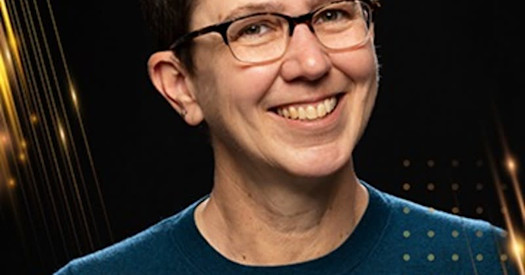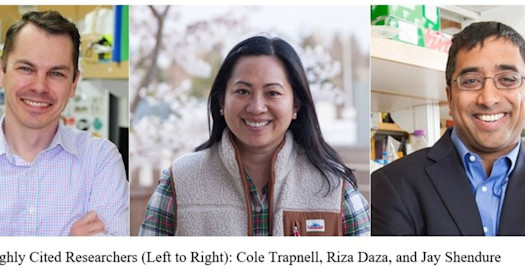Dr. Tina Lockwood, Ph.D., is the definition of accomplished in her field, which puts her at the leading edge of research focused on precision medicine and the genetics of human disease. Lockwood is an associate professor at the University of Washington, where she serves as the director of the Genetics and Solid Tumor Diagnostics Laboratory in the Department of Laboratory Medicine. Lockwood also co-leads the cell-free DNA working group at the Brotman Baty Institute for Precision Medicine, where the group is applying genomics to identify DNA signals in blood and other bodily fluids to tackle a number of medical challenges ― including improving prenatal screening, cancer diagnosis and detection of transplant rejection. Lockwood, who joined UW’s Department of Laboratory Medicine in 2014, is an expert in prenatal screening, molecular oncology and genetic disorders. Lockwood earned a doctorate degree in cellular and molecular biology form the University of Wisconsin-Madison and later completed a postdoctoral fellowship in clinical chemistry at the Washington University School of Medicine in St. Louis. When she’s not in the lab, Lockwood enjoys camping, running and spending time with family. What are the most important characteristics of a good leader and what leadership traits are overrated? Building a strong team, leading by example and listening are all important traits when it comes to effective leadership. I find those leaders who take each individual’s strengths into account and play to those strengths tend to have the right idea. By contrast, top-down or autocratic leadership tends to pit employees against one another and does not lead to a collaborative environment.
As a woman, what is the most significant barrier to becoming a leader? Women are natural team builders who work to build group consensus and promote the people around them. However, those qualities can be disadvantages in the STEM [science, technology, engineering and math] fields where you often need to loudly promote your own accomplishments in order to be recognized.
How can women achieve more prominent roles in their organizations? To start, women need to recognize the value they bring to a team and make sure that value is acknowledged by leadership. For example, if leadership perceives a team member as potentially redundant without contributing a unique and valuable perspective, they’re not going to be given as many opportunities. Although it may feel uncomfortable at first, self-advocacy is extremely important. Second, taking advantage of mentorship is key. There are a multitude of mentoring opportunities in STEM fields. It’s also important that we recognize the contributions of women and encourage women to promote one another so our successes are more visible. Whether mentoring is informal, microscale feedback such as how to effectively deliver public presentations, or formal mentoring [focused] on professional development, mentorship can be extremely beneficial for those who are either getting started in their field or want to take their career to the next level.
What key lessons did you learn from a woman who has inspired, mentored or sponsored you? Just be yourself. Don’t try to fit yourself into a certain mold that you think is what’s wanted or expected. Steer clear of leadership opportunities that force you to take on responsibilities that you don’t actually want. If you are not true to who you are, “opportunities” will ultimately drive you away from success. At one time, I was interviewing while pregnant, and I was worried because it wasn’t possible to hide. One of my female mentors wisely advised me that if an organization is not supportive when you’re expecting, how can you expect to be supported throughout your career when personal and professional challenges arise? An organization should value you for who you are, where you are.
What advice do you have for the next generation of female leaders? I recommend being open-minded to new career options. At some point in your path, you might end up exploring opportunities that you weren’t initially considering. Approach your decisions carefully, but don’t be afraid to try something new. For example, I never even knew that clinical laboratory medicine existed, let alone planned to work in the field. My graduate work was very basic-science oriented, and a career fair ultimately led me down an entirely new path. Be open, persevere and stay nimble to react to changes in the workplace. That’s going to be particularly important in the fast-changing STEM fields.
How important is networking and how do you expand your contacts? Networking is really important, and I doubt any professional would disagree with that. I hope that most people recognize that networking is essential for a successful career and that professional circles are small enough that you shouldn’t ever burn bridges. Expanding your contacts can happen in many ways, including meeting people at a conference, collaborating on projects, connecting on social media and asking mentors for an introduction. I’ve personally had the most networking success from meeting people in person. I found my current job through a contact I met years ago when we were both trainees at a conference. He congratulated me after my talk, and we had a great conversation about our mutual scientific endeavors. I ended up calling him years later when I was looking to relocate, and here we are.
What would you do differently in your career? Honestly, I don’t think I would do anything differently. As I walk back through my career, my schooling and research progression has been circuitous, not linear. But all of the steps and winding tracks led me to where I am now. I strongly believe that a nonlinear path is key for appreciating the leadership challenges that will arise. Very few projects in life will go exactly as planned. When I went to graduate school, I planned to eventually have an independent, basic science-funded lab at a research institution and that changed when I discovered laboratory medicine. After my postdoctoral fellowship, I switched from clinical chemistry to genetics ― a completely different area of laboratory medicine. At one point I had accepted a job at a commercial lab, sold my current home and purchased a new home, then found out they did not have a position for me any longer. And that is how I circuitously ended up coming to the UW. I could have been discouraged by any single step in the process, but it has become empowering to know that I can be flexible. How you choose to roll with the unexpected in life is what will ultimately make you successful.
Where will we find you on a Saturday afternoon? With my family. I have three little kids ― ages 5, 7 and 9. We try to stick together for family activities on the weekends, as much as we can. We enjoy hiking, camping, city parks and all of the many family-friendly activities that are available in the greater Seattle area.
What would be the title of your autobiography? “DNA and Self-Discovery.”
We’d love to hear from more women across all industries who are challenging the status quo. Does it sound like you? If it does, click here and fill out our questionnaire.
Daring Women Q&A responses have been edited and condensed.
Link to originally published article.


